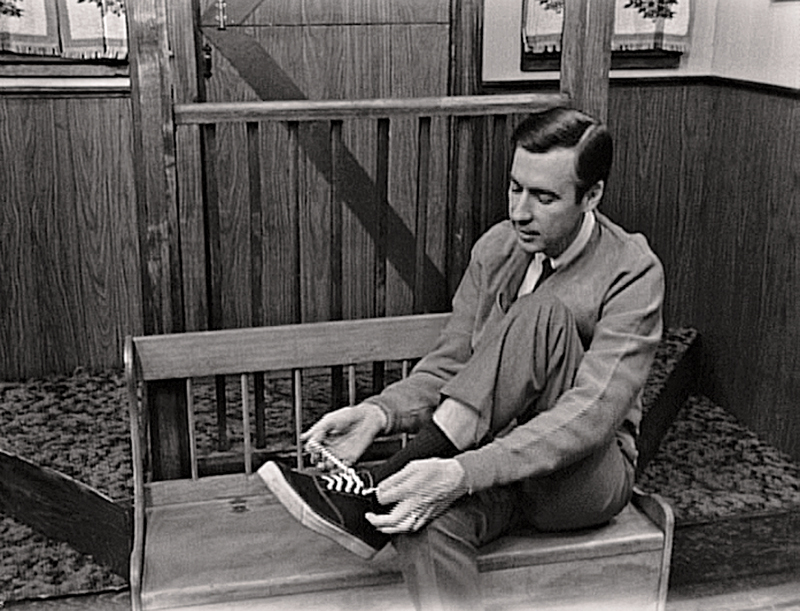
Won’t You Be My Neighbor Day honors legendary Mister Rogers

Readers offer their memories of show’s impact
(Mar. 20, 2023) —Although Fred Rogers died in 2003, his legacy lives on each March 20 through Won’t You Be My Neighbor Day.
“Mister Rogers’ Neighborhood” was a staple of children’s television for more than 30 years, offering a simple message of kindness wrapped in a sweater and sneakers. First broadcast in Canada in 1962 and then soon after on public television stations across the United States, the show welcomed children of all ages into Mister Rogers’ neighborhood and home with the opening theme song, “Won’t You Be My Neighbor.”
Ahead of the special day to honor this television icon and the philosophy he extolled to his young audiences, the Pioneer invited readers to offer reflections on his legacy on a Facebook posting. Hundreds weighed in – most with a simple thumbs up or a heart.
“My son didn’t have a father in his life,” said Shari Sheldon. “He loved watching Mister Rogers. He said he was his friend.”
Ileana Meraz noted that her granddaughter loves Daniel the Tiger in memory of Mister Rogers – “very sweet.”
Ernie Velilla recalled growing up watching Mister Rogers. “I learned some really good things from that show when I was just a lad,” he said.
Kindness above all
A few readers commented on the show’s oddness, with its “creepy puppets,” but even they could not argue with its enduring value.
“His message of kindness was timeless,” said Debbie Magliano.
“I do believe in kindness among neighbors, and I wish it were more prevalent today,” stated Kimberly Calkins Ingalls.
Jeanette Larsen Fernandez too loved watching “this gentle show every day.” She went on to say how impressed she was with Tom Hanks’ portrayal of Rogers on the big screen.
“He did Mister Rogers justice,” said Fernandez.
Living in the ordinary
The final episode of the Emmy-awarding show aired on Aug. 31, 2001, but it continued in weekday reruns. Rogers died in February 2003 of stomach cancer at age 74.
By fall 2008, his program was slated to be available for airing once a week for broadcast markets around the country. PBS estimated that in May 2008, 63 percent of its member stations carried the show, covering 79 percent of American TV households, according to the Pittsburgh Post-Gazette.
“(The program) seemed to exude a certain mood, this certain spirit wherever it was playing,” Robert Thompson, director of the Bleier Center for Television and Popular Culture at Syracuse University, said in a 2018 interview with NPR.
“Even though it was aimed at kids, it affected anybody else that was within hearing distance of that extraordinary voice and the extraordinary things he said. But, when I say extraordinary, they were not out of the ordinary. They were extraordinary in their absolute ordinariness. He had this idea that you didn’t condescend to the very young and that you could explain things to them,” Thompson continued.
Helping heal the country
Before his passing, the nation was rocked by horrifying images on 9/11. And, just as they had done countless times before, children and adults alike could again find comfort from Mister Rogers. He produced four videos in the studios where “Mister Rogers’ Neighborhood” was filmed, and they were released on the first anniversary of the tragedy.
On the 10th anniversary, People reported on how Mister Rogers helped a devastated nation to grieve and the message he had for parents. He said that although it may be difficult, it’s important to have open conversations with children in order to help them feel safe.
“I’m so grateful to you for helping the children in your life to know that you’ll do everything you can to keep them safe. And to help them express their feelings in ways that will bring healing in many different neighborhoods,” Mister Rogers added.
Robin Bayes, for one, won’t soon forget him – or his signature song that was a soundtrack for generations of children.
“I’ll always have that voice in my head,” said Bayes. “Welcome to my neighborhood. You certainly don’t hear that anymore.”

David Scholz
David Scholz is back in journalism as a freelance writer and photographer after nearly two decades in education. Prior to moving into teaching in 2000, he worked as a full-time journalist since 1988 for rural community and small daily newspapers in Central Ohio and Northern Nevada, and later in California with The Business Journal in Fresno and dailies in the Bay Area, including The Oakland Tribune and The San Francisco Chronicle. More recently Scholz also worked in an editing, writing, and page layout role with the Rossmoor News.
